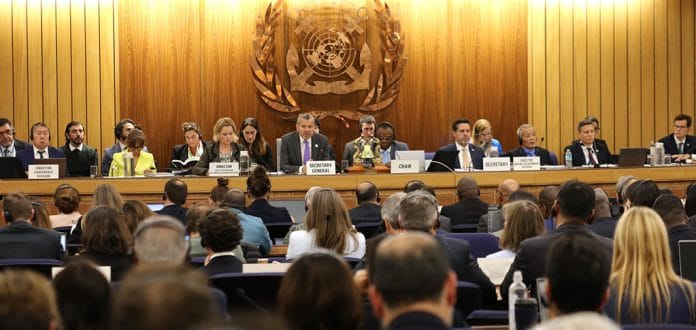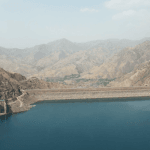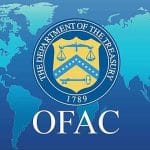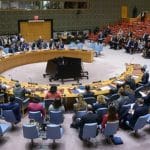After failing to reach consensus on an emissions reduction measure amid strong U.S. pressure, a majority of countries at the UN’s International Maritime Organization (IMO) voted on October 17 to postpone by a year a critical decision on a global carbon price mechanism for international shipping.
The U.S. and Saudi Arabia, the world’s two largest oil producers, have strongly opposed a carbon price on shipping during negotiations at the London-based IMO.
Washington made its tough position in support of U.S. economic interests clear a week before the meeting, sending out a strongly worded note on October 10 (see below) laying out U.S. arguments against the IMO’s Net-Zero-Framework (NZF) proposal. The message, which was signed by three U.S. cabinet secretaries (State, Energy and Transportation), declared the U.S. would consider various sanctions as well as other commercial and administrative penalties against countries that vote in favor of the NZF.
U.S. President Donald Trump called on IMO member states on October 16 to vote against the measure, claiming on the Truth Social platform that Washington “would not stand for this global green new scam tax on shipping and will not adhere to it in any way, shape or form.”
Details of the IMO vote
In terms of outcomes, at the October 17 extraordinary session of the IMO’s Marine Environment Protection Committee (MEPC ES.2), IMO member states voted to delay the adoption of the NZF by about one year.
This delay came through a collective vote (57 in favor of delay vs. 49 against with 21 abstentions) rather than a single-country veto, as there is no mechanism for the U.S. to unilaterally stop the NZF. But clearly, the U.S. messaging helped secure the delay. The group arguing for the delay was led politically by the U.S. together with Saudi Arabia (with diplomatic support from other states). Saudi Arabia formally called for the vote.
The UK Chamber of Shipping, along with international partners from Belgium, Denmark, Japan, the Netherlands, Norway and Singapore have urged IMO member states to make history in London by adopting the Net-Zero Framework at next week’s extraordinary meeting of the Marine…
— UK Chamber of Shipping (@ukshipping) October 8, 2025
China had previously signaled support for carbon-pricing ideas, but ultimately China supported the motion to delay. Several states that earlier supported parts of the NZF (or had signaled support in April) either voted for the delay or abstained. The delay was carried 57–49 with a crucial 21 abstentions, and some countries on the abstain lists included maritime powers such as Greece, Cyprus, and Japan, obviously concerned by the threats laid out by Washington.
As a consequence of the delay, the global shipping industry now faces greater uncertainty, and the timeline for implementation is now unclear. There is a risk that rather than a unified global framework via IMO, individual states/regions might push their own shipping emissions rules, raising fragmentation risk.
Text of US Government October 10 message:
Taking Action to Defend America from the UN’s First Global Carbon Tax — the International Maritime Organization’s (IMO) “Net-Zero Framework” (NZF)
Joint Statement by Secretary of State Rubio, Secretary of Energy Wright, and Secretary of Transportation Duffy
“President Trump has made it clear that the United States will not accept any international environmental agreement that unduly or unfairly burdens the United States or harms the interests of the American people. Next week, members of the IMO will vote on the adoption of a so-called NZF aimed at reducing global carbon dioxide gas emissions from the international shipping sector. This will be the first time that a UN organization levies a global carbon tax on the world.
The Administration unequivocally rejects this proposal before the IMO and will not tolerate any action that increases costs for our citizens, energy providers, shipping companies and their customers, or tourists. The economic impacts from this measure could be disastrous, with some estimates forecasting global shipping costs increasing as much as 10 percent or more. We ask you to join us in rejecting adoption of the NZF at the October meeting and to work together on our collective economic and energy security.
The NZF proposal poses significant risks to the global economy and subjects not just Americans, but all IMO member states to an unsanctioned global tax regime that levies punitive and regressive financial penalties, which could be avoided. The United States is considering the following actions against nations that support this global carbon tax on American consumers:
Pursuing investigations and considering potential regulations to combat anti-competitive practices from certain flagged countries and potential blocking vessels registered in those countries from U.S. ports;
Imposing visa restrictions including an increase in fees and processing, mandatory re-interview requirements and/or revisions of quotas for C-1/D maritime crew member visas;
Imposing commercial penalties stemming from U.S. government contracts including new commercial ships, liquified natural gas terminals and infrastructure, and/or other financial penalties on ships flagged under nations in favor of the NZF;
Imposing additional port fees on ships owned, operated, or flagged by countries supporting the framework; and
Evaluating sanctions on officials sponsoring activist-driven climate policies that would burden American consumers, among other measures under consideration.
The United States will be moving to levy these remedies against nations that sponsor this European-led neocolonial export of global climate regulations. We will fight hard to protect our economic interests by imposing costs on countries if they support the NZF. Our fellow IMO members should be on notice.” End text.








